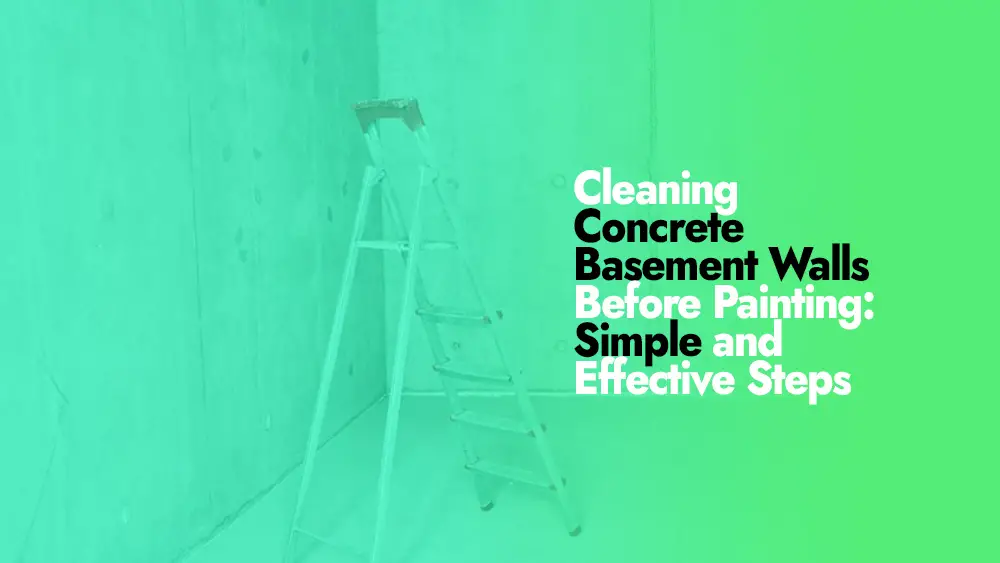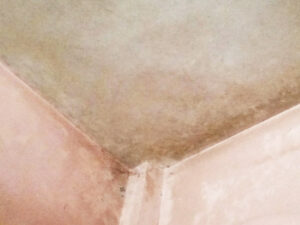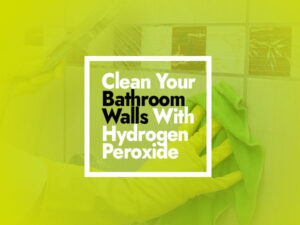Do you want to make your dull and dingy concrete basement walls into a place that feels new and exciting? Before you jump into the fun world of painting, you need to make sure your walls are clean and ready. It might seem hard to clean the concrete walls of a basement, but with the right plan and a little bit of hard work, you can get great results.
In this blog post, we’ll show you how to clean your concrete basement walls in a few easy steps. We’ll talk about everything you need to know, from getting rid of dirt and grime to getting rid of tough spots. By doing these steps, you’ll get a clean sheet that lets the paint stick well and looks like it was done by a professional. Get ready to breathe new life into your basement by using these easy ways to clean concrete walls before painting.
How to Figure Out Why It’s Important to Clean Concrete Basement Walls Before Painting
When painting concrete basement walls, many people forget to clean them first, which is an important step. But it’s important to know how important it is to clean these walls before painting them if you want a good finish that will last.
When you clean concrete basement walls, you get rid of any dirt, dust, and grime that has built up over time. These things can make it hard for paint to stick, which can lead to a bad finish and less toughness. By cleaning the walls, you make a smooth, clean surface that lets the paint stick well and gives the job a professional look.
Also, cleaning helps get rid of mold, mildew, and spots that might be on the walls. Mold and mold not only make things look bad, but they can also be bad for your health. Proper cleaning gets rid of these problems, making the place better to live in and stopping them from coming back in the future.
Also, cleaning the walls gives you a chance to look for cracks, chips, or other surface flaws that might need to be fixed before painting. It makes sure that the surface is in good shape and is ready to be painted.
Overall, the best way to prepare a surface for painting is to clean the concrete basement walls first. It makes the paint stick better, makes the car look better generally, stops health risks, and lets repairs be done. Taking the time to clean the walls well will make the painting job go better and give you more satisfaction in the end.
How to Clean Basement Concrete Walls Before Painting
Before you paint your concrete basement walls, you should make sure they are clean. Cleaning well makes sure that the paint sticks well and gives you a smooth, professional finish. Follow these easy steps to clean the concrete walls of your basement:

Step 1: Get your stuff together
Before you start cleaning your concrete basement walls, you need to make sure you have everything you need. The brush with stiff bristles will help you get rid of dirt and grease well. The cleaning fluid will be mixed in the bucket. Choose a pavement cleaner or mild detergent that is right for the job. Safety masks and rubber gloves are necessary to protect your eyes and skin from any chemicals or debris that might be around. Lastly, the hose or pressure washer will be used to rinse off the cleaning solution and clean the walls fully.
Step 2: Remove loose trash
First, clean the walls of any loose dirt, dust, spiders, or other things. Use the stiff-bristled brush to gently scrub the surface, paying special attention to corners and other hard-to-reach spots. Beginning at the top, work your way down. This step will help the cleaning solution reach deeper into the walls and clean them better.
Step 3: Mix a solution to clean.
Fill the bucket with water and follow the directions on the bottle of mild detergent or pavement cleaner. Use the right amount of cleaner by following the suggested dilution ratios. Blend the solution well to make a cleaning solution that will clean the walls well.
Step 4: Keep yourself safe
Before you start to use the cleaning solution, put on your safety glasses and rubber gloves. This safety gear will protect your eyes and skin from any chemicals that might splash or come in touch with them. When working with cleaning products, safety should always be the first thing on your mind.
Step 5: Wet the walls first
Use a hose or a power washer to fully wet the walls. Soaking first helps remove dirt, grime, and other contaminants, which makes it easier to get rid of them. Make sure the walls are evenly wet, and pay special attention to spots with a lot of dirt or stains. Before going on to the next step, give the water a few minutes to soak into the surface.
Step 6: Put the cleaning solution on the dirt
Dip the brush with stiff bristles into the cleaning solution and scrub the walls in a circle. Work in sections that are easy to handle, starting at the top and going down. To get rid of dirt and grime, use hard but gentle pressure. Pay extra attention to places where you can see stains or a pile of dirt. You can let the cleaning solution sit on the surface for a few minutes before scrubbing to get rid of stains that won’t come off. Keep scrubbing until you’ve cleaned all of the wall’s surface.
Step 7: Wash down the walls
After you’ve used the cleaning solution to scrub the walls, it’s time to rinse them. Use a hose or pressure washer to rinse the walls well, getting rid of all the cleaning solutions. To avoid lines or residue, start at the top and work your way down. Make sure that all of the cleaning solutions is washed away by paying close attention to corners and cracks. Take your time with this step to make sure you rinse everything well.
Step 8: Get rid of tough spots
If you find stains that are hard to get rid of with normal cleaning products, you may need to use a concrete stain remover. Follow the directions carefully and apply the stain remover to the spots that need it. Let it sit for the time you’re told, which is usually a few minutes. Then, use the brush with stiff bristles to scrub the spots. Rinse the spot remover off well to make sure there is no residue left.
Step 9: Let the walls dry for a while
Give the walls a lot of time to dry after you’ve rinsed off the cleaning solution and any spot remover. This step is very important before you start painting. Depending on how humid your basement is, it may take a day or two for the water to dry. Open the windows or turn on the fans to get more air moving and speed up the drying process.
Step 10: Look at it and fix it up
After the walls have dried, check them carefully for any dirt, stains, or rough spots that might still be there. Use the brush with stiff bristles or a damp cloth to clean and touch up any spots that need more work. Watch out for corners, edges, and places that are hard to get to. This last check makes sure that your walls are smooth, clean, and ready to be painted. Before you start painting, take your time to make sure the surface is clean and ready.
Mistakes to avoid when cleaning and painting concrete basement walls
Homeowners often make the same mistakes when they try to clean their concrete basement walls before painting them. To properly prepare the surface and get the best results, you must avoid making these mistakes. Here are some mistakes you should try to avoid:
Not enough cleaning: Not cleaning the walls well enough is one of the biggest mistakes. Simple cleaning might leave dirt, dust, or other contaminants behind, which could make it hard for the paint to stick. Take the time to clean the walls well and get rid of any dust or stains.
Skipping pre-soaking: Soaking the walls in water first helps remove dirt and grime, which makes cleaning them easier. If you skip this step, cleaning can be more difficult and less effective. Make sure to soak the walls well before using any cleaning products on them.
Using strong cleaners or the wrong ones: Using harsh or abrasive cleaners can hurt the surface of the concrete. Don’t use bleach, ammonia, or chemical cleaners on the concrete because they can etch or change the color of the concrete. Instead, use gentle detergents or cleaners made for concrete that are suggested for the job.
Choosing not to wear safety gear: Cleaning products and dirt can hurt your skin and eyes. Wear safety glasses and rubber gloves at all times to keep yourself safe from any possible dangers. Also, make sure there is enough airflow by opening windows or using fans to reduce your exposure to fumes.
Not rinsing well enough: If you don’t rinse the walls well enough after cleaning, cleaning solution or dust can be left behind, which can make it hard for the paint to stick. Rinse the walls well with clean water, making sure to get rid of all of the cleaning solution.
Rushing the drying process: Before painting, it’s important to let things dry the right way. Give the walls enough time to dry all the way. If you hurry the drying process, moisture could get stuck, which could cause the paint to fail or mold to grow.
Ignoring repairs: Cleaning the walls gives you a chance to look for cracks, chips, and other problems on the surface. If you don’t make these fixes, the paint could start to peel or the damage could get worse. Take the time to fix anything that needs it before you paint.
By not doing these common things, you can make sure that your concrete basement walls are clean and ready to be painted. If you take the time to do it right, the paint job will be better and last longer.
The best ways to keep concrete basement walls clean for the long term
Keeping your concrete basement walls clean is not only important for how your space looks, but also for how long it will last and how healthy it will be. Here are some of the best ways to keep your concrete basement walls clean and make sure the effects last:
Regular cleaning routine: Set up a regular cleaning schedule to keep dirt, dust, and other particles from building up on the walls. This can be done by dusting the walls with a microfiber cloth or vacuuming with a brush tool to get rid of loose particles.
Clean up spills and stains right away: If you see spills or stains on the walls, you should clean them up right away. Use a soft brush and a mild detergent or pavement cleaner to gently scrub the area. When you act quickly, you can keep spots from setting in and making them harder to get out later.
Don’t let water build up: Water can cause mold, mildew, and other problems. Ensure proper ventilation in your basement to avoid excessive moisture buildup. If you need to, use dehumidifiers to keep humidity levels at the right amount.
Cracks and other damage should be fixed: Check the walls often for cracks, chips, and other damage. Fix these problems right away to stop them from getting worse and to keep the surface clean and smooth.
Avoid harsh chemicals: Don’t use harsh chemicals, bleach, or sharp cleaners to clean the concrete basement walls. These can hurt the top of the concrete and make it less strong. Use mild detergents or cleaners made for concrete that are suggested for the job.
Test cleaning products in places no one will see: Before using any new cleaning products, make sure they won’t stain or damage the walls by trying them out in places no one will see. This keeps the walls from looking bad, which could happen otherwise.
Protect the walls while you’re doing things: If you use your basement for things like a workshop or a laundry room, you should take steps to protect the walls. Put down mats or drop cloths to catch any messes that might happen.
Regular checks: Check the walls every so often for signs of mold, mildew, or wetness problems. Address any problems right away to stop more damage and keep the surroundings clean and healthy.
Educate your family: Tell everyone in your family how important it is to keep the concrete basement walls clean. Tell them not to lean against the walls or touch them with dirty hands or things that can leave marks or spots.
Consider sealing or waterproofing: Depending on the needs of your basement, you might want to seal or dry the concrete walls. This extra layer of protection can stop water from getting in and make it easier to clean.
By doing these things to keep your concrete basement walls clean, you can enjoy a clean and healthy environment and keep the walls’ strength and look for a long time. Your basement will stay clean and inviting for years to come if you clean it regularly and keep up with upkeep.
FAQs
Why is it important to clean basement walls made of concrete before painting them?
It’s important to clean the concrete basement walls before painting them for more than one reason. First, it makes sure that the paint sticks well, so the finish is more durable and lasts longer. Second, cleaning gets rid of dirt, grime, and stains that can make painting walls look bad. Cleaning also helps get rid of mold, mildew, and other harmful substances, making the place where you live healthy. Lastly, cleaning lets any surface flaws be seen and fixed, making sure that the paint goes on smoothly and evenly.
What should I use to clean the concrete walls in my basement?
Use gentle detergents or cleaners made just for concrete to clean the walls of a basement that is made of concrete. Don’t use strong chemicals, bleach, or rough cleaners on the concrete surface, as they can damage it. Follow the directions on the cleaning products you buy, and test them in an inconspicuous place before using them on the whole wall.
Can a power washer be used to clean the concrete walls of a basement?
A power washer can be a good way to clean the concrete walls of a basement. But it’s important to use the right pressure setting and tip to keep the surface from getting damaged. Also, be careful around cracks or places where the concrete is loose, as high-pressure water can make the damage worse. When using a power washer, you should always follow the safety rules and wear the right gear.
How often should I clean the cement walls in my basement?
How often you need to clean concrete basement walls relies on things like how much dirt builds up, how much humidity there is, and how you use the space. Most of the time, you should clean the walls at least once a year. But if you see a lot of dirt, spots, or mold growth, you may need to clean more often.
Can I paint over walls that have mold on them?
It’s not a good idea to paint over wet basement walls before taking care of the mold problem. When you paint over mold, you can trap the mold spores under the paint, which can lead to more mold growth and possible health risks. Before you can start painting, you must clean and treat the moldy areas properly. If you have a lot of mold growth, you should talk to a professional who knows how to get rid of mold.
Do I need to seal my concrete basement walls or make sure they don’t get wet?
Sealing or waterproofing concrete basement walls isn’t always required, but it can help keep water out and make cleaning easier in the future. If you’re worried about wetness or want to give your walls an extra layer of protection, you might want to seal or waterproof them. Talk to a professional to find out what the best choices are for sealing or waterproofing your basement.
Final Thoughts
Before painting the walls of a concrete basement, it is very important to clean them. By using the right cleaning methods and avoiding common mistakes, you can make sure the paint sticks well, the finish looks good, and the results last for a long time. Cleaning the walls thoroughly to get rid of dirt, grime, stains, and mold not only makes them look better but also makes the room a healthy place to live. If you keep your concrete basement walls clean and do regular upkeep, you can have a beautiful paint job that will last for a long time. So, put in the time and effort to clean your basement walls before painting them, and you’ll get a beautiful, well-kept place in return.







